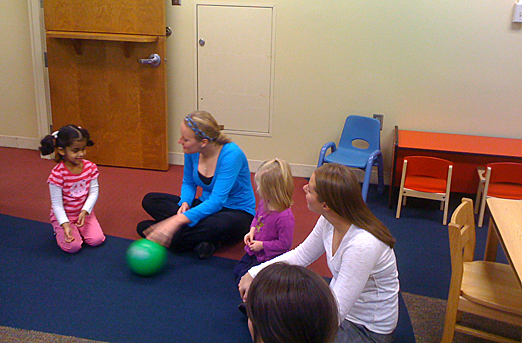A recent grant from the U.S. Department of Education will help ensure that local elementary school students who are deaf or hard-of-hearing soon will have new opportunities to learn.
The University of Toledo and the University of Akron will use a joint grant to develop course work and practicum experiences for speech-language pathology graduate students.

Lauren Notario, left, and Emily Everly, students in the Speech-Language Pathology Program, worked with children in the Auditory and Language Enriched Program.
She said there is a great need for the program because there are very few people trained in this field in northwest Ohio.
“Most children, with early intervention, can expect to be on par with their peers by kindergarten,” Pakulski said. “If we want to maximize their opportunities, we have to begin intervention in the first year of life.”
Pakulski said there have traditionally been two schools of thought in the audiology field. There are those who believe one should never force a deaf or hard-of-hearing person to use technology such as cochlear implants or hearing aids, and he or she should embrace deaf culture and learn sign language.
But the opposing viewpoint believes in those devices and supporting a family’s desire to help children learn to listen and talk.
“There was a time when a deaf person’s use of cochlear implants was looked down upon by the deaf community,” she said. “But our approach here is that families should do what is right for them and learn about the options available to their children.”
Pakulski said she is working on the grant in conjunction with Dr. Todd Houston, associate professor at the School of Speech-Language Pathology and Audiology at the University of Akron.
“The University of Akron was selected because of its long history of working with kids and taking this approach to listening and spoken language,” she said. “The geographical convenience between UT and UA will also make it more convenient to host joint events.”
Pakulski said the grant and new program also play into the Auditory and Language Enriched Program, a play group for young deaf and hard-of-hearing children that is run by speech-language pathology graduate students as a community service. The program helps young children in similar circumstances bond, while targeting listening and spoken language skills and educating parents.
Both UT and UA will choose five students for four of the five years the grant is in place. The first group of first-year graduate students accepted into the UT program are Adam Barnes, Mary Dunn, Ryan Rummel, Emily Russell and Leslie Starr.